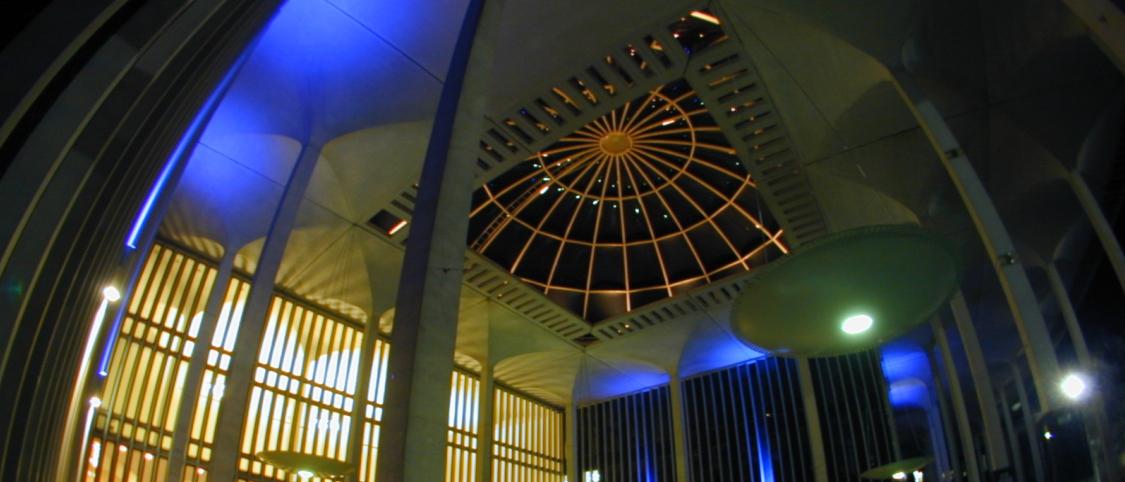

The University Concert Band
Kevin Champagne, Conductor
Sheldon - Triumph of The Argonauts Whitacre - October Champagne - Todo Lo Posible
The University Symphony Orchestra
Christopher David Neubert, Conductor
Brahms - Tragic Overture, Op. 81
Chance - Variations on a Korean Folk Song
The Charlie Daniels BandThe Devil Went Down to Georgia



Sunday, October 20 3 pm





Department of Music and Theatre
University at Albany
presents:
UAlbany Concert Band
Kevin Champagne, conductor and
UAlbany
Symphony Orchestra
Christopher David Neubert, conductor
Sunday, October 20, 2024 at 3pm
Main Theatre
UAlbany Performing Arts Center
Program
UAlbany Concert Band
Triumph of the Argonauts……………………….Robert Sheldon
October………………………………………………Eric Whitacre
Todo Lo Posible.……………………………...Kevin Champagne
The Devil Went Down to Georgia………………Charlie Daniels, John Crain, William DiGregorio, Fred Edwards, Charles Hayward, James Marshall, Arr. Michael Brown
INTERMISSION
UAlbany Symphony Orchestra
Tragic Overture……………………….Johannes Brahms, Op.81 1880 (1833-1897)
Variations on a Korean Folk Song…….…John Barnes Chance 1965 (1932-1972)
Program Notes
Triumph of The Argonauts – Robert Sheldon
The Argonauts were a band of heroes in Greek mythology who accompanied Jason in his quest to find the Golden Fleece. The Argonauts included many heroes of ancient Greece, including Orpheus, Castor & Pollux, and Hercules. This piece was inspired by their heroic journey, as Jason and his crew overcame the numerous challenges presented by the Gods during their quest to capture the Golden Fleece and return home, where Jason would assume his rightful role as king.
October – Eric Whitacre
“October is my favorite month. Something about the crisp autumn air and the subtle change in light always make me a little sentimental, and as I started to sketch I felt the same quiet beauty in the writing. The simple pastoral melodies and subsequent harmonies are inspired by the great English Romantics (Vaughn Williams, Elgar) as I felt this style was perfectly suited to capture the soul of the season.” Eric Whitacre
Todo Lo Posible – Kevin Champagne
This piece was inspired by this band’s slightly-too-many-butalso-quite-good percussion section. I don’t like to see an underutilized percussion section, so I composed a piece where there would be plenty for everyone to do. It is basically a theme and variations, with a completely unrelated light feeling middle section, which begins a percussion only feature. The title refers to “as much as possible”, meaning, “Play a lot of notes and play them loudly!”
The Devil Went Down To Georgia – Charlie Daniels, John Crain, William DiGregorio, Fred Edwards, Charles Hayward, James Marshall, Arr. Michael Brown
This fun toe-tapping piece is based on the 1979 hit by The Charlie Daniels Band. This piece features a narrator, and two soloists: The devil, and his challenger!
Johannes Brahms – Tragic Overture, Op. 81
In the summer of 1880, when Brahms was visiting the fashionable resort of Bad Ischl (known for its medicinal springs and brine baths), he composed two concert overtures. “One weeps, the other laughs,” he commented to his biographer, Max Kalbeck. The laughing piece referred to his rollicking Academic Festival Overture, Opus 80, filled with light-hearted student songs, written to acknowledge his doctoral degree bestowed by the University of Breslau, introduced by soft trombone chords. The weeping piece was his Tragic Overture, Opus 81, and a heavy counterpoise to the first. Brahms explained his
motivation saying, “I (simply) could not refuse my melancholy nature the satisfaction of composing an overture for tragedy. ”
Though it was not written for any specific tragedy, speculation has suggested Tragic Overture was possibly written in contemplation of a commission to write incidental music for Goethe’s Faust. (This did not materialize.) Another possibility is that the composer had read Nietzsche’s work The Birth of Tragedy from the Spirit of Music, published in 1872. This Overture is dramatic commentary on the spirit of tragedy in human life.
Tragic Overture begins with two slashing chords, which preface the solemn main theme, orchestrated within low strings and low winds in D minor. Trombones and tuba build a bridge to a contrasting F major theme, but relief is short. A third main subject stemming earlier sketches is also introduced. Writing in sonata form, the composer moves directly into a convulsive development. Brahms scholar Walter Niemann wrote, “The fleeting touches of thrilling, individual emotion in this overture are not to be found in conflict and storm, but in the crushing loneliness of terrifying and unearthly silences in what have been called ‘dead places.’” Themes surge and spin in a tempest of emotion. A traditional recapitulation, introduced by two fortissimo chords, summarizes the main ideas with certain alterations. Opus 81 premiered on December 20, 1880 in Vienna under the baton of Hans Richter.
Variations on a Korean Folk Song was written for concert band by John Barnes Chance in 1965. As the name implies, Variations consists of a set of variations on the Korean folk song "Arirang", which the composer heard while in South Korea with the U.S. Army in the late 1950s. In 1966 the piece was awarded the American Bandmasters Association's Ostwald Award.
The orchestra transcription is by Robert Longfield 2006.
The theme is based upon a concert A♭ major pentatonic scale. At the beginning of the composition, the first part of the theme, resembling Arirang, is introduced quietly in the clarinets with the
violas and cellos in the orchestral transcription. Five wonderful variations follow.
The first variation, marked Vivace, turns the theme into a series of rapid sixteenth notes, played by the woodwinds and strings and temple blocks at first and then the entire ensemble. It ends with a set of sixteenth notes played by the entire orchestra in unison.
The second variation, marked Larghetto, is much slower. The second part of the original theme is played in inversion—first by a solo oboe, then by the flutes, violins and horn. The original melody is played by solo trumpet.
The third variation, marked Allegro con brio, is a March in 6/8 time. The trumpets play a series of rapid eighth notes based on both parts of the theme; the woodwinds and strings repeat this, and the march becomes more and more frenzied until it reaches its peak. At this point, the orchestra plays a rapid descending whole tone scale starting in the highest voices and ending in the lowest.
The fourth variation, marked Sostenuto, is much slower and is in 3/2 time with a rhythmic ostinato played by the timpani on a G♭2 using "hard sticks on muted head" to create a hint of ethnic drum sound. The theme is played within the structure of beautiful sonorous chords.
The fifth and final variation, marked Con Islancio ("with impetuousness"), is faster and begins with a long solo in the percussion section. The piccolo, flutes and upper strings join in, playing the second part of the theme, and then the brass enter playing the first part. This section is in 3/4 and is a hemiola; the brass play as if each measure were divided into two beats, while the woodwinds and upper strings play three beats to a measure. The music grows louder and more excited and ends with a final quotation of the sixteenth note melody from the first variation.
Performers
UAlbany Concert Band
Kevin Champagne, Conductor
Flute
Brianna Boyce
Abby Davis
Liz McDonald
Mudra Patel
Amber Ramey
Magdalena Ramos
Chelsea Roque
Garima Yadav
Oboe
Alex Oates
Clarinet
Grace Augustern
Myles Dansby
Jacques, Katelyn
Stephanie Oshiotse
Saylor Skidds
Bass Clarinet
Jake Avella
Alto Saxophone
Edwin Aguilar
Brian Feder
Ashleigh Koenig
Jack Piranio
Tenor Sax
James Caruso
Xavier Rosario
Baritone
Saxophone
Molly O’Toole
Trumpet
Cirava Hammond
Keziah Job
Carly Johnson
George McFarland
Kal Tellefsen
Carlton Truax
Daniel Zamroz
French Horn
Emma Clemments
Andrew Meng
Trombone
Rachel Grudus
Rich Massa
Andrew Scaptura
Baritone/Euphonium
Andrew Brunetti
Tsvi Gold
Sylvar NazarioGoodwin
Catherine Semaska
Jay Smith Tuba
Spencer Dodge
Andre Speller
Jordan Teo
Percussion
Milan Jevremov
Lillian Magurno
Aeden Perry
Ciara Reilly
Renee Scott
Jonathan Wolter











